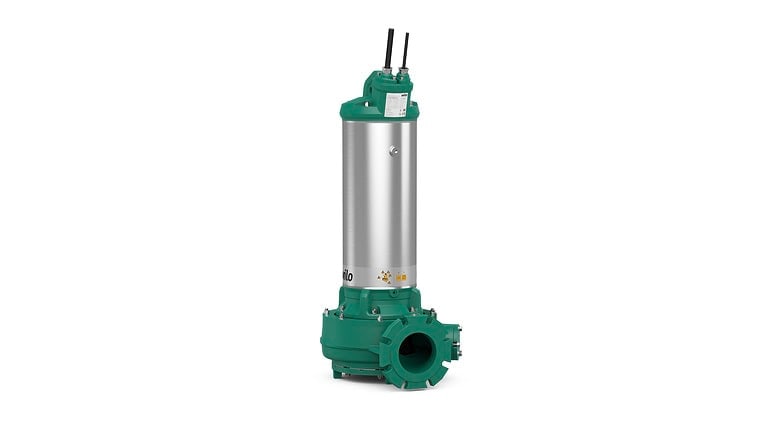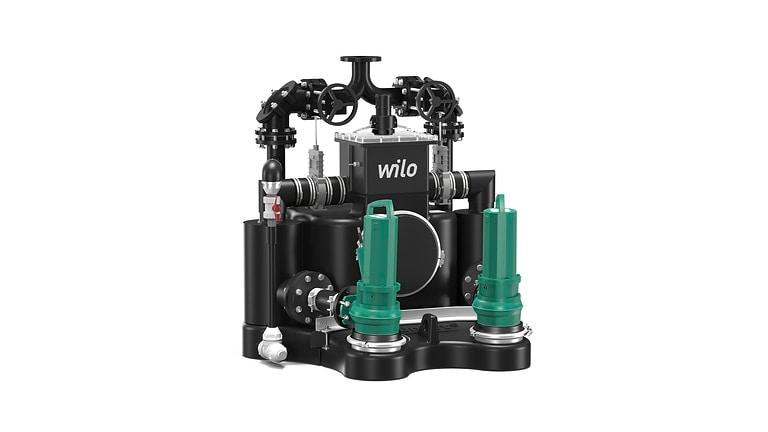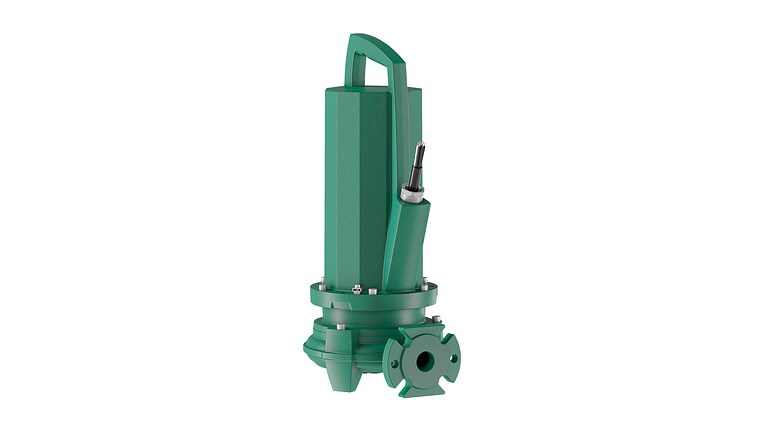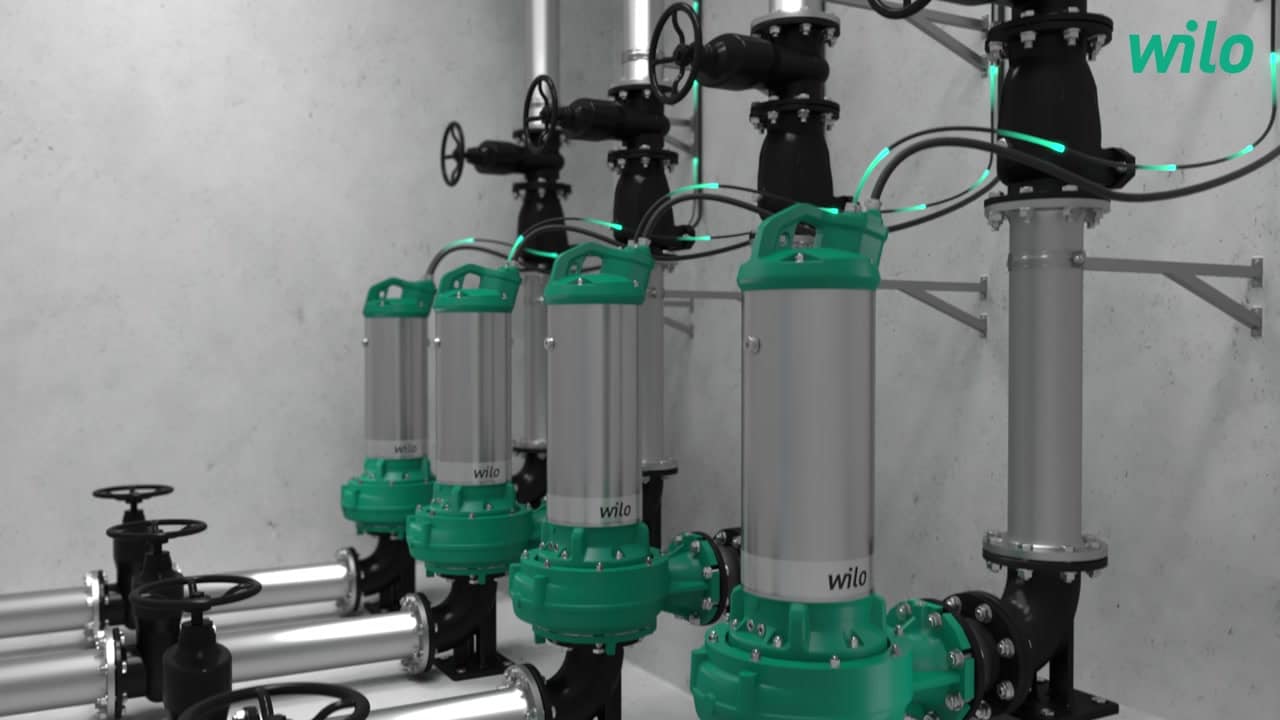More safety with low-clogging sewage pumps
Operators of sewage networks and water treatment systems in municipalities or in the industrial sector are familiar with the problem: At night or on the weekend, of all times, an important sewage pump breaks down because it is clogged. The reason is solids or fibrous materials such as nonwoven fabrics or wet wipes in the wastewater system, which block the sewage pump. It is important to act now, as if the clogging persists, the pumping station can overflow and cause damage. The consequence: A service team must be deployed to lift the sewage pump out of the chamber, clean it, open it, clear it, reassemble it and put it back in, all of which is expensive. If you want to avoid sewage pump clogging and the expensive resulting damage, you should familiarise yourself with sewage pumps with low-clogging impellers. These pumps are notable for their reliable operation in sewage with a high solids content.
Which solutions for low-clogging sewage pumps does Wilo offer?
Wilo sewage pumps, wastewater pumps and faecal pumps are notable for their high resistance to clogging due to their optimised impeller geometry and are also highly efficient. The flow-optimised geometry of the impellers largely prevents solids from getting stuck in the impeller and increases energy efficiency at the same time.
However, it is not just the impeller geometry that is important. At Wilo, we consider the optimal interaction of all factors of a sewage pump. This is why we use intelligent controls, modern motor technologies, durable and new materials as well as communication devices for monitoring in our innovative sewage pump systems. This gives you, as the operator of our sewage pumps, maximum operational reliability, energy efficiency and sustainable cost-effectiveness.
We provide you with holistic solutions for all your sewage transport requirements. Avoid clogging, reduce operating costs and increase operational reliability – Wilo offers you the right series with low-clogging impellers, precisely suited to your individual requirements.
Discover our system solutions.

Wilo-Rexa SOLID-Q
Highest operational reliability at maximum efficiency with intelligent anti-clogging function.

Wilo-EMUport CORE
Reliable wastewater collection with small pumps thanks to solids separation.

Wilo-Rexa PRO-S
Macerator with double shear effect provides reliable pressure drainage.
Find out more here about how the Nexos Intelligence of the Wilo-Rexa SOLID-Q provides you with maximum operational reliability.
Practical example: Problems caused by wet wipes in sewage
Wet wipes consist of nonwoven fabrics Unlike conventional toilet paper, however, these nonwoven fabrics do not dissolve in water. On the contrary: They get knotted into long braids, which then get tangled in the impellers of the pumps and block them, resulting in service calls and high operating costs. Another problem is that the nonwoven fabrics get soaked up with grease, as disposing of food leftovers down the toilet has unfortunately become common practice. However, the mixture of nonwoven fabrics and grease can quickly grow into huge plugs that permanently clog the pipes and sewage pumps. Instead of flushing the wet wipes away, they should be disposed of in the bin. This will help prevent clogging in the wastewater system and reduce the risk of damage to pipes and other infrastructure.
FAQ – Frequently asked questions
What are solids and what do they have to do with sewage pumps?
Various things get into sewage these days that do not belong there. Braids of fibres with the circumference of a thick rope then form in the sewer system or the sewage pumping station. These fibre braids can wind themselves around the impeller of the sewage pump. The pump runs hot and clogs. This results in cost-intensive service visits to the pumping station operators and increases the municipal charges.
What should not be put into the sewage system to avoid clogging?
To avoid clogging in wastewater systems, you should be careful not to dispose of certain objects and substances in the toilet, sink or drain. Here is a list of things that do not belong in sewage.
Cleaning wipes and wet wipes:
Although some wipes may be labelled as "flushable", they can still cause clogging as they do not break down as easily as toilet paper.
Kitchen roll:
Kitchen paper is thicker and less soluble than toilet paper and can therefore cause clogging.
Rags and towels:
Substances that enter the wastewater system can get caught in pipes and cause clogging.
Kitchen waste and food scraps:
Food waste can form deposits and should be disposed of in the household waste or an organic waste container.
Fats:
Fats and oils can solidify in the wastewater system and cause clogging. Allow grease to cool and dispose of it in the rubbish or in a suitable container for used grease.
Hygiene products such as tampons and sanitary towels:
These products are not suitable for the wastewater system and can cause clogging. Instead, dispose of them in a rubbish bin.
By being careful not to put these items and substances into the sewage, you will help prevent clogging and maintain the efficiency of the wastewater systems. This not only helps to avoid expensive repairs and maintenance, but also protects the environment and conserves our water resources.
Do flushable wet wipes clog sewage pumps?
Even so-called "flushable wet wipes" can cause problems in pipes and sewage pumps. Although they are marketed as "flushable", many types of flushable wet wipes do not disintegrate quickly or easily into sewage like toilet paper. Even if a flushable wet wipe is easily transported out with the sewage through the pipeline system of a private or public building, it can clog the pumps in the sewage treatment system. To avoid these problems, it is best to dispose of the wipes in the bin.
What is the impact of sewage pumps’ motor technology?
In order to pump high amounts of solids, pumps must run at high speeds. For smaller sewage volumes, 2-pole motors are often more suitable than 4-pole motors. Therefore – depending on the individual case – one solution to avoid clogging is to replace 4-pole motors with large impellers with 2-pole pumps with smaller impellers. Furthermore, in case of clogging problems, the motor speed can also be increased, as it is especially important during pump start-up to suck in the high solids concentration at the bottom of the pump chamber with high kinetic energy and to move it out of the impeller.
